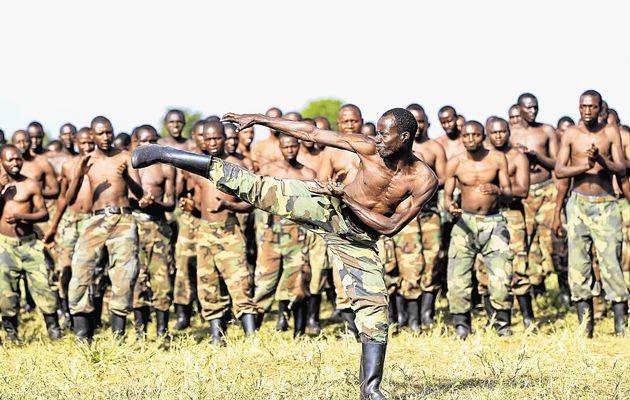Soldiers crawling in new oil fields as in Chiadzwa

ZIMBABWE’S military incursion into the Mashonaland Central province for a routine training exercise is part of efforts by the Zimbabwe Defence Forces (ZDF) to familiarise itself with the area as the Southern African country stands on the verge of discovering oil reserves along the Zambezi basin.
The operation is meant to secure what may turn out to be oil reserves in Muzarabani.
Before publication, efforts to contact the Invictus Energy management drew blanks.
In e-mailed responses to questions posed by the Zimbabwe Independent, the ZDF confirmed that it had notified stakeholders in Mashonaland Central ahead of the training exercise and was committed to protecting everything inside the country.
ZDF, the statement further read, was well positioned to defend the country.
“All government ministries, the provincial leadership, traditional leaders and all stakeholders in Mashonaland Central province were engaged during the planning stages of the exercise.
“At the commencement of the exercise, the whole nation was then informed through a press release issued on September 23 2022,” ZDF said.
Responding to whether ZDF would be ready to secure and protect Zimbabwe’s oil fields if ongoing exploratory work turns out to be positive, the ZDF said it would be resolute in protecting, “everything within the boundaries of Zimbabwe”.
“The constitution of Zimbabwe Amendment (No.20) Act 2013 Section 212 provides that, ‘The function of the Defence Forces is to protect Zimbabwe, its people, its national security and interests and its territorial integrity. What is implied in the constitution is that the ZDF must protect everything within the boundaries of Zimbabwe’,” the ZDF said.
As part of its adventures in Mashonaland Central, ZDF noted that it was collaborating with all state security agencies charged with the constitutional duty of protecting the country’s territory.
“The defence and security of our nation is not the preserve of the ZDF alone but encompasses the role played by other security agencies.
“Therefore, the act of defending the country’s territorial integrity naturally requires the highest level of coordination between all the defence and security agencies which is achieved through joint training activities such as the training exercise currently underway in Mashonaland Central province,” the ZDF added
In August, Australia Stock Exchange-listed energy explorer Invictus Energy started drilling the first of two test wells at its Cahora Bassa claims, expressing optimism that exploration data indicated that Zimbabwe could potentially strike oil.

The company was awarded rights to prospect for oil along the Zambezi valley in 2020, which was followed by negotiations between the firm and the government to come up with a Production Sharing Agreement (PSA).
At that time, independent estimates indicated that the prospect could potentially yield 1,3 billion barrels of equivalent (BOE) oil or 206 billion litres of oil in the Zambezi valley basin.
Last month, the ZDF announced that it was embarking on a month-long training exercise in Mashonaland Central, which would culminate in the movement of a sizeable number of troops and military vehicles from Harare into the area as optimism rose that Invictus Energy’s efforts would transform Zimbabwe into an oil-producing country.
The troops are being deployed to six districts, namely Bindura, Mbire, Muzarabani, Rushinga, Mt Darwin and Shamva. Invictus is conducting its operations in Muzarabani.
The training exercise, which comes after ZDF conducted routine military drills in Masvingo last year, is set to end on October 21 as the army gears to “sharpen and perfect its operational skills so as to enhance the Zimbabwe Defence Force’s capability to fulfil its mandate”.
Petroleum and security sources told the Independent that the ongoing military drills in the province which borders Zimbabwe with Zambia and Mozambique were primarily meant to “safeguard what could potentially turn out to be Zimbabwe’s oil treasure at a time the country is on a drive to turn around its fragile economy”.
The sources, in separate briefings, told this publication last week that the military, in line with its constitutional mandate, also wanted to stamp its presence in the area and avoid the situation deteriorating into chaos as was the case when Zimbabwe discovered a lucrative diamond treasure trove in Manicaland, which was projected to satisfy 25% of global demand at the time.
Over a decade ago, as Zimbabwe was reeling under unprecedented economic turmoil, the country stumbled upon alluvial diamonds in Chiadzwa, which triggered informal mining activities by illegal miners.
The ZDF later deployed soldiers into the area to maintain order as the illegal mining activities often degenerated into violence resulting in death, in some cases.
As the government, through the ZDF, moved in to foster order in the area, the military also secured shareholding in some of the mining companies licensed to extract the gems. ZDF holds equity in Chinese diamond miner Anjin.
“As prospects remain bright that Zimbabwe petroleum exploration activities will yield positive results, the military should also be geared to ensure that any future oil mining activities will be orderly and not turn out to be chaotic as was the case in Chiadzwa when the country discovered huge diamond deposits in 2010,” a petroleum industry source told the Independent.
Rural district council sources in Mashonaland Central province told the Independent that the excursion of the military into the area stretched into Zimbabwe’s territorial border zones with Mozambique and Zambia.
In neighbouring Mozambique, a deadly insurgency flared up in the country’s resource-rich Cabo Delgado province, displacing over 570 000 people and claiming thousands of lives. The insurgent outfit known as Al Sunnah WaJaama, with Islamic inclinations, escalated violence in Cabo Delgado, triggering fears that the insurgency could spill over into Zimbabwe and disrupt the country’s security and key imports such as fuel which are shipped through the Port of Beira.
The militants have disrupted freight movement along the Mutare-Beira trade corridor which gives Zimbabwe the shortest route to the sea and poses a serious threat to the economically strategic Beira-Harare fuel pipeline, commonly known as Feruka.
Zimbabwe shares a border with Mozambique and Zambia in Kanyemba which is in the Mbire District of Mashonaland Central.






